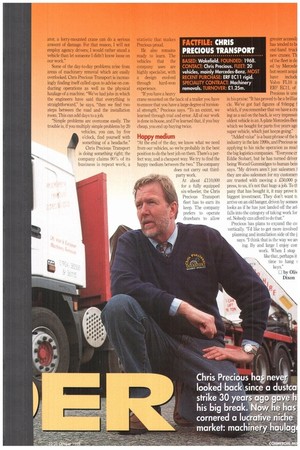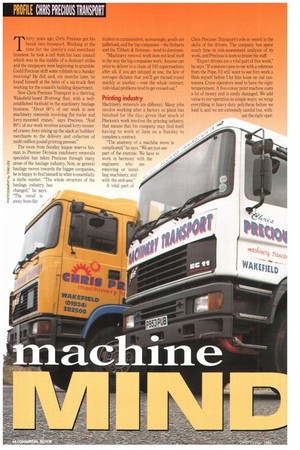Chris Precious haOnev looked back since a dustca strike 30
Page 47

Page 46

If you've noticed an error in this article please click here to report it so we can fix it.
years ago gave h his big break. Now he has cornered a lucrative niche market: machinery haulag
Thirty years ago, Chris Precious got his break into transport. Working at the time for the family's coal merchant business, he took a call from his local council which was in the middle of a dustcart strike and the ratepayers were beginning to grumble. Could Precious shift some rubbish on a Sunday morning? He did; and, six months later, he found himself at the helm of a six-truck fleet working for the council's building department.
Now Chris Precious Transport is a thriving, Wakefield-based 20-strong fleet, with a well. established foothold in the machinery haulage business. "About 60% of our work is now machinery removals involving flat trailer and lorry-mounted cranes," says Precious. "And 9900 of our work revolves around lorry-mount. ed cranes; from taking up the slack at builders' merchants to the delivery and collection of multi-million pound printing presses."
The route from Sunday league reserve binman to Premier Division machinery removals specialist has taken Precious through many areas of the haulage industry. Now, as general haulage moves towards the bigger companies, he is happy to find himself in what is essentially a niche market. "The whole structure of the haulage industry has changed," he says. "The trend is away from flat
trailers to curtainsiders; increasingly, goods are palletised, and the big companies—the Stobarts and the Tibbett & Brittens—tend to dominate.
"Machinery removal work does not lend itself to the way the big companies work. Anyone can price to deliver to a chain of 100 supermarkets; after all, if you get delayed at one, the law of averages dictates that you'll get turned round quickly at another—over the whole contract, individual problems tend to get evened out"
Printing industry
Machinery removals are different. Many jobs involve working after a factory or plant has finished for the day; given that much of Precious's work involves the printing industry, that means that his company may find itself having to work at 5am on a Sunday to complete a contract.
"The anatomy of a machine move is complicated," he says. "We are just one part of the exercise. We have to work in harmony with the engineers who are removing or installing machinery, and with the end-user."
A vital part of Chris Precious Transport's role is vested in the skills of the drivers. The company has spent much time in risk-assessment analysis of its work, and Precious is keen to praise his staff.
"Expert drivers are a vital part of this work," he says. "If someone came to me with a reference from the Pope, I'd still want to see him work a Hiab myself before I let him loose on our customers. Crane operators need to have the right temperament. A five-colour print machine costs a lot of money and is easily damaged. We add value to our operation in simple ways; we wrap everything in heavy-duty polythene before we load it, and we are extremely careful but, with
out the right oper ator, a lorry-mounted crane can do a serious amount of damage. For that reason, I will not employ agency drivers; I would rather stand a vehicle than let someone I didn't know loose on our work."
Some of the day-to-day problems arise from areas of machinery removal which are easily overlooked. Chris Precious Transport is increasingly finding itself called upon to advise on conducting operations as well as the physical haulage of a machine. "We've had jobs in which the engineers have said that everything is straightforward," he says, "then we find two steps between the road and the installation room. This can add days to a job.
"Simple problems are overcome easily. The trouble is, if you multiply simple problems by 20 vehicles, you can, by five 0 o'clock, find yourself with something of a headache." Chris Precious Transport is doing something right; the company claims 90% of its
business is repeat work, a statistic that make-. Precious proud.
Ile also remains ready to learn. The vehicles that the company uses are highly specialist, with a design evolved through hard-won experience.
"If you have a heavy crane mounted on the hack of a trailer you have to ensure that you have a large degree of torsional strength," Precious says. "TO an extent, we learned through trial and error. All of our work is done in-house, and Tve learned that, if you buy cheap, you end up buying twice.
Happy medium
"At the end of the day, we know what we need from our vehicles, so we're probably in the best position to do the best job on them. There's a perfect way, and a cheapest way. We try to find the happy medium between the two." The company
does not carry out thirdparty work.
At about £110,000 for a fully equipped six-wheeler, the Chris Precious Transport fleet has to earn its keep. The company prefers to operate drawbars to allow
greater accessib has tended to bi ond-hand trucli new cranes, Th of the fleet is do ed by IvIercede but recent acqui have include Volvo ELIO a ERF ECU, of Preoious is uns in his praise: "It has proved to be a brilliar de We've got fuel figures of 9.6mpg f which, if you remember that we have a cra ing as a sail on the back, is very impressh oldest vehicle is an A-plate Mercedes-Ben which we bought for parts five years ago super vehicle, which just keeps going."
"Added value" is a buzz phrase of the h industry in the late 1990s, and Precious se applying to his niche operation as mud the big logistics companies. "Everyone cr Eddie Stobart, but he has turned driver being Worzel Gummidges to human bein says. "My drivers aren't just salesmen f they are also salesmen for my customer: are trusted with moving a £50,000 p: press, to us, it's not that huge a job. To th pany that has bought it, it may prove tt biggest investment. They don't want k arrive on an old banger, driven by soma looks as if he has just landed off the arl, falls into the category of taking work for ed. Nobody can afford to do that."
Precious has plans to expand the co: vertically. "I'd like to get more involved planning and installation side of the j
says. "[think that is the way we an ing By and large I enjoy con
work. When I stop like that, perhaps it Lime to hang keys."
ILI by Olk Dixon
FACTFILE: CHRIS
PRECIOUS TRANSPORT
BASED: Wakefield. FOUNDED: 1968. CONTACT: Chris Precious. FI F ET: 2q vehicles, mainly Mercedes-Benz. MOST RECENT PURCHASEERF EC1 1 rigid. SPECIALITY CONTRAL Machinery removals. TURNOVER: £1.25m.
















































































































